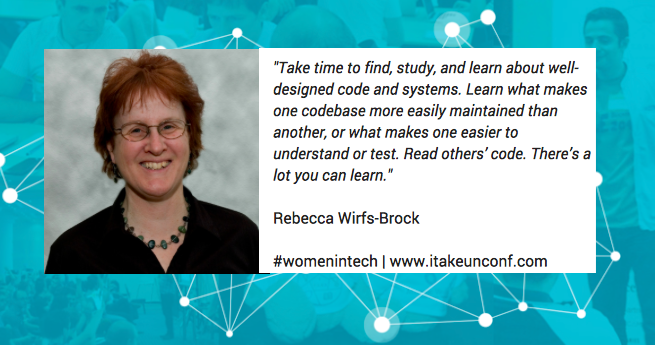Rebecca Wirfs-Brock is the object design pioneer who invented the set of design practices known as Responsibility-Driven Design (RDD), the first behavioral approach to object design. She is the lead author of two software design books and design columnist for IEEE Software. By accident, she started the x-Driven Design meme (TDD, DDD, BDD…). Although best known for software design, she is has a passion simply expressing complex requirements and effectively communicating software architecture. Rebecca joined #itakeunconf in 2013 as keynote, at the first edition of the unconference.
When sharing more about #womenintech, Rebecca is one of the most important role models ladies in the field mention or look up to. Read on to find her professional story and lessons learned along the way.
#1. What’s your professional story? Why did you choose to develop a career in this domain?
I went to university with no idea what I would major in. I liked both sciences and the humanities. I had a part time job at school grading tests. We’d scan the tests (which were marked in pencil) onto a tape, then take that tape to the computer center. They would run a job to print out students’ test results and grades.
I wanted to learn how that program worked. So for fun, I took my first computing class learning FORTRAN. And I was hooked. Writing programs was not only fun; programs could do something useful. So that is how I discovered programming—by accident. I liked solving problems by programming. I still do.
#2. Share with us an important lesson you’ve learned since you’ve been working in IT
I’ve learned that you won’t know if something is possible unless you try doing it. Sometimes we hold ourselves back because we don’t think we can do what seems like some seemingly impossible task. If you are a part of a team, you can do even more great things than you can on your own.
Being a software engineer at Tektronix (a company that made oscilloscopes and workstations, among other hardware products), I learned that with good team collaboration, the right management support, and the belief in what we were doing, we could do amazing things. I have taken this spirit of collaboration and can-do attitude with me throughout my career.
#3. What piece of advice would you give to the next generation of #womenintech?
Keep learning. The programming languages, tools, libraries, and database technologies you work with 10 years from now will be different from those you use today. There’s always something new to learn. Don’t just limit yourself to learning new programming languages and tools or the latest popular libraries. Take some time to learn things outside of your daily work. For example, I turn to blog by Adrian Colyer, The Morning Paper, https://blog.acolyer.org/. I find reading about technology trends and research stretches my brain. And then I get on with my daily work.
Take some time to learn things outside of your daily work. For example, I turn to blog by Adrian Colyer, The Morning Paper. I find reading about technology trends and research stretches my brain. And then I get on with my daily work.
But more importantly, take time to find, study, and learn about well-designed code and systems. Learn what makes one codebase more easily maintained than another, or what makes one easier to understand or test. Read others’ code. There’s a lot you can learn.
At I T.A.K.E Unconference, we aim to move the needle by offering to women in tech access to a fast-learning, practical & inspirational community for their growth. Join the 5th edition, 11-12 May, Bucharest and meet remarkable tech ladies.


Leave a Reply